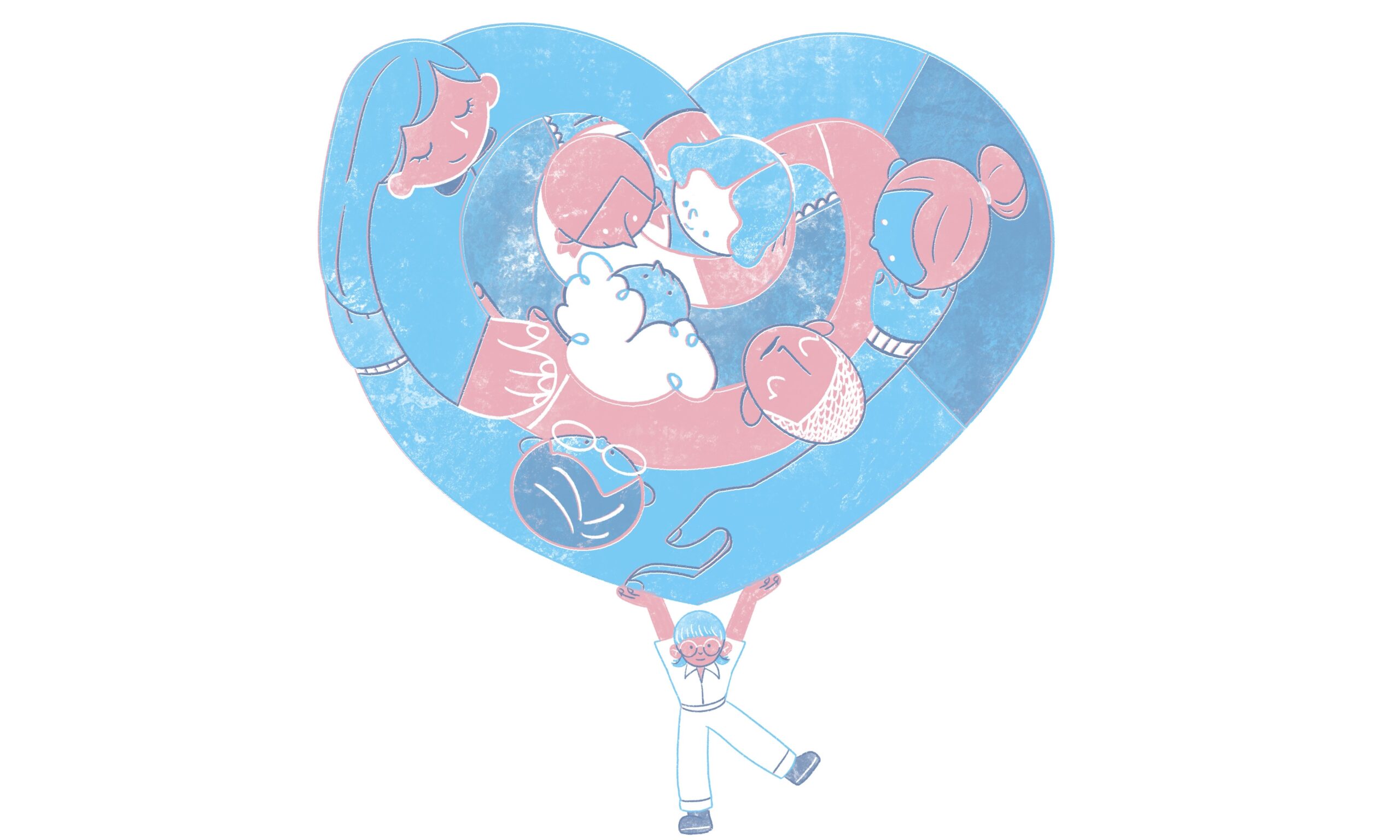
EEJOON CHOI / NEXTGENRADIO
What is the meaning of
home?
Lucia Cheng speaks with Iowa native and community organizer Denver Foote, who moved from Clear Lake to Des Moines in hopes of finding a place where they belong. Their race and their family’s financial struggles made Foote feel out of place in their hometown. Now, they’re campaigning to be the next mayor of Des Moines, the city where they found a home and where they hope everyone else can too.
In a state that is restricting LGBTQ+ rights, one activist chooses to stay and fight
Listen To The Story
Click here for audio transcript
DENVER FOOTE: Home is a multifaceted idea that is tied to community and as I evolve and I grow, my community changes.
Hello, my name is Denver Foote. I use they/them pronouns. I am a community organizer and activist, renter, hairdresser, Medicaid recipient and I am also a candidate for mayor of Des Moines. I have been locally organizing for years now around racial justice, bodily autonomy, and basic human rights.
I love Iowa because it’s where my family came from, but I want to see Iowa thrive. I want to see Iowa not be so aggressive to underserved communities. I don’t appreciate our most underserved communities getting just the short end of the stick.
When I experienced brutality by the police, the people that uplifted me brought me meals. The people that uplifted me connected me with a lawyer. The people who uplifted me connected me to a therapist. I was like, these people are fighting for me, even though I can’t.
I grew up in Clear Lake, IA, majority white community. A lot of like old money and my family wasn’t from Clear Lake like we weren’t kind of the same cut of bread, a little bit to say.
My mother’s side of the family immigrated from Mexico to Iowa to work in the cornfields. They moved to Iowa, and to America, to have this dream of something better. And what they were met with was low wages, racism and oppression.
We were a very working poor family. My father worked like 50 hours a week and my mother was a chronic alcoholic. So it was like, my home was a little broken growing up and I remember going to school and like being made fun of for the clothes I wore because they weren’t nice. I remember sometimes having to skip lunch because we couldn’t afford it.
And I was having really bad panic attacks to the point I was blacking out, and I think a lot of those were emotions were not feeling like I fit into my community. It was a lot for a young person to go through.
I started finding that my experiences were not singular. I deserved better. Like I deserved more.
And I feel like here in Des Moines, I have found more of a home like Des Moines but now I’m actually surrounding myself with people who have gone through these struggles or are affected by them and there’s also fighting for difference, you know, they’re also alongside me for the ride.
I wouldn’t fight, I wouldn’t try so hard to change things if I didn’t think Iowa was home.
Home is important. It’s a place of warmth. It’s a place of acceptance. It’s a place of. Love. Gosh, I have a lot of love to give. [They laugh.]
Growing up, Denver Foote felt like their home was “a little broken.”
They often walked to school hungry. They watched their parents mask their emotions with alcohol. Panic attacks interrupted attempts to get ready for school, some so strong that Foote would black out. For Foote, it was too much for a young person to handle.
“I grew up not really having a support system,” Foote said. “I remember in middle school, you have to do chorus and you do recitals, and my family was never in the crowd. I always had to go with my friends’ family. So I think I grew up at a young age supporting myself, and with that, you have to grow up really fast.”
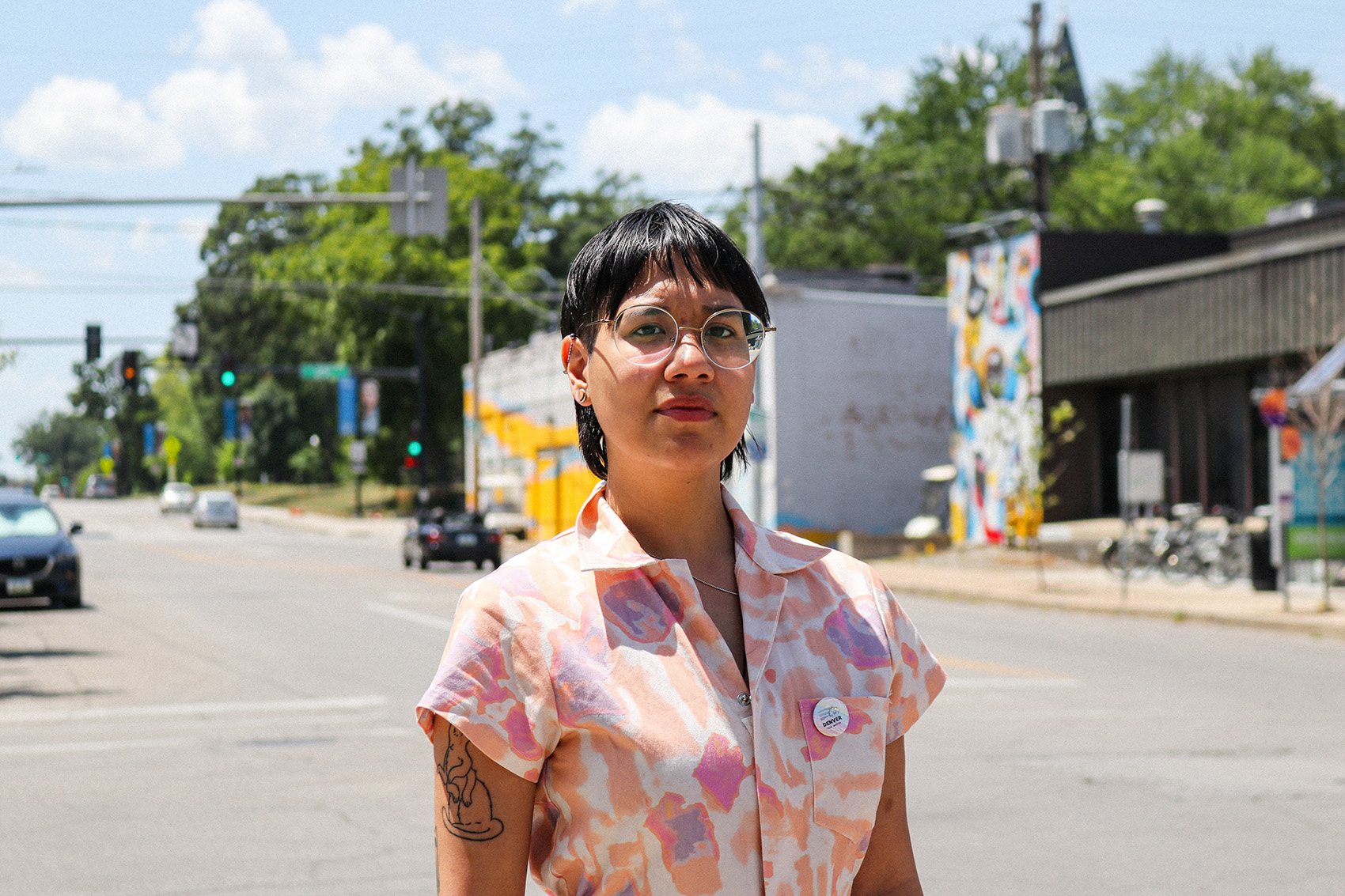
Foote stands on the corner of University Ave., where they frequent Mars Cafe.
LUCIA CHENG / NEXTGENRADIO
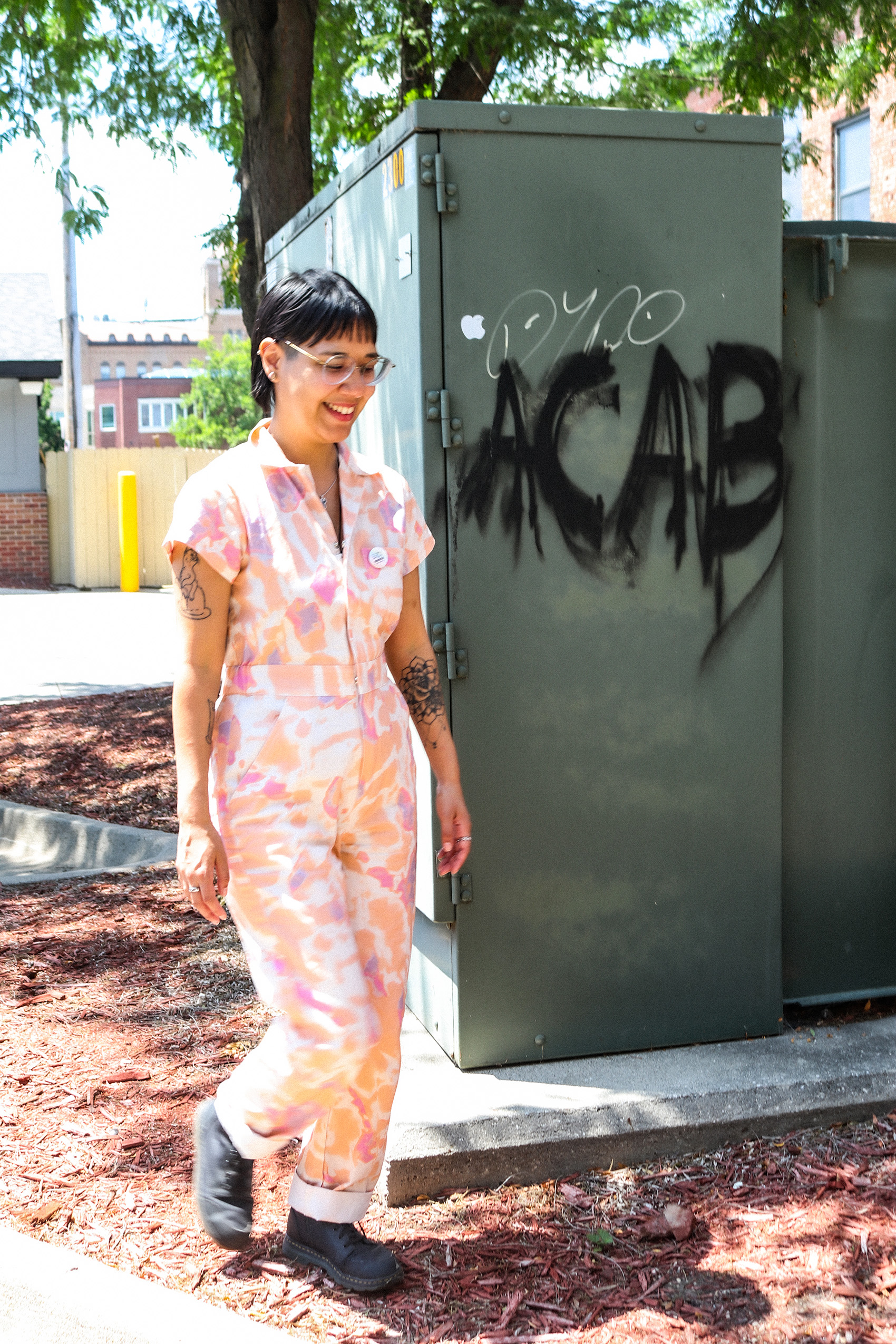
Foote comes across graffiti in the Drake neighborhood of Des Moines that reads “ACAB,” standing for “All Cops are Bastards.” As part of their campaign goals, Foote believes the police should be defunded.
LUCIA CHENG / NEXTGENRADIO
Foote said they felt they were different, but it wasn’t until they were in high school that they knew why. In Clear Lake, they were bullied not only for the clothes they wore, but also for their race.
Their mother’s side of the family immigrated from Mexico, and their father’s from the Philippines. Ninety-three percent of their hometown’s population is white. Foote – who identifies as nonbinary and uses they/them pronouns – also had few LGBTQ+ resources in their hometown. All these factors made them feel out of place.
But instead of moving away from Iowa, Foote chose to stay; they still felt rooted to the state. By intentionally making a home in Des Moines, Foote has joined others who have gone through similar struggles. They’ve realized that they don’t have to be alone.
Iowa passed four laws targeting LGBTQ+ people and proposed 29 of them this year. According to The Des Moines Register, the bills include banning the use of school bathrooms that do not align with birth sex and gender-affirming care for minors, bills which the American Civil Liberties Union of Iowa said will have “devastating consequences” for transgender children in Iowa.
“I started finding that my experiences were not singular. I deserved better. I deserved more.”
They found the community they had been looking for after becoming involved in Sen. Bernie Sanders’ campaign for president in 2019. When they heard Sanders speak, it was the first time Foote heard someone stand up for people like them.
“I started finding that my experiences were not singular. I deserved better. I deserved more,” Foote said.
Activism gave them purpose and a chosen family of people who fought for the same values Foote held. George Floyd’s murder at the hands of Minneapolis police in 2020 sparked protests in the streets of Des Moines. Foote said the police beat and maced them as they were leaving the protest, and charged them with rioting, unlawful assembly and failure to disperse. Foote sued the city and the officers involved for excessive force and arrest without probable cause, litigation that is still ongoing. The officers claim Foote was resisting and attempting to flee.
Iowa laws proposed this year that target LGBTQ+ people
Iowa laws passed this year targeting LGBTQ+ people
Once Foote got back home, they remembered sitting on the couch in the summer’s golden hour light. Hearing voices outside, they walked to their front porch and saw a wave of protesters marching for police reform.
“I was so distraught in dealing with so much trauma,” Foote said. “I remember feeling such a strong emotion because – even though I couldn’t be there for them – they were there for me and for the countless people who couldn’t be there. It felt extremely powerful in a moment when I felt powerless.”
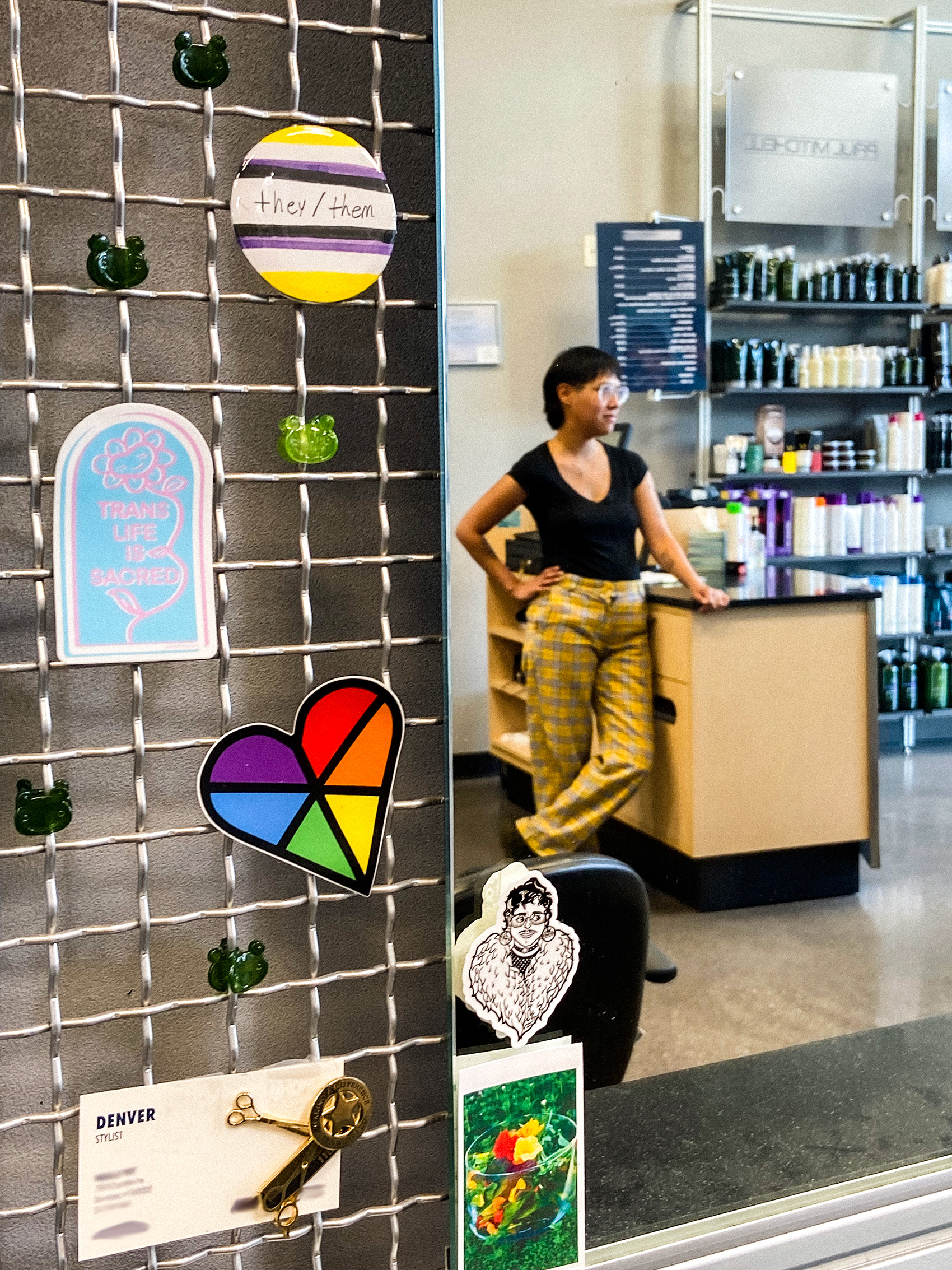
Foote expresses their identities through trinkets pinned to their booth at the hair salon.
LUCIA CHENG / NEXTGENRADIO
Inspired, Foote chose to fight on behalf of those people in return and began a grassroots campaign for mayor. Though they’ve made Des Moines their home, Foote still finds themselves disappointed in Iowa. Foote said they see people who are grieving being met with violence instead of care, bodily autonomy being taken away and housing remaining unattainable for many.
Foote said they are running to represent what they believe are the most underserved communities in Des Moines: the ones that struggle to pay the bills, face oppression and feel like they don’t belong.
“The state is still home because I’m fighting for the people here. I wouldn’t fight, I wouldn’t try so hard to change things if I didn’t think Iowa was home,” Foote said. “Home is important. It’s a place of warmth. It’s a place of acceptance. It’s a place of love. Gosh, I have a lot of love to give.”
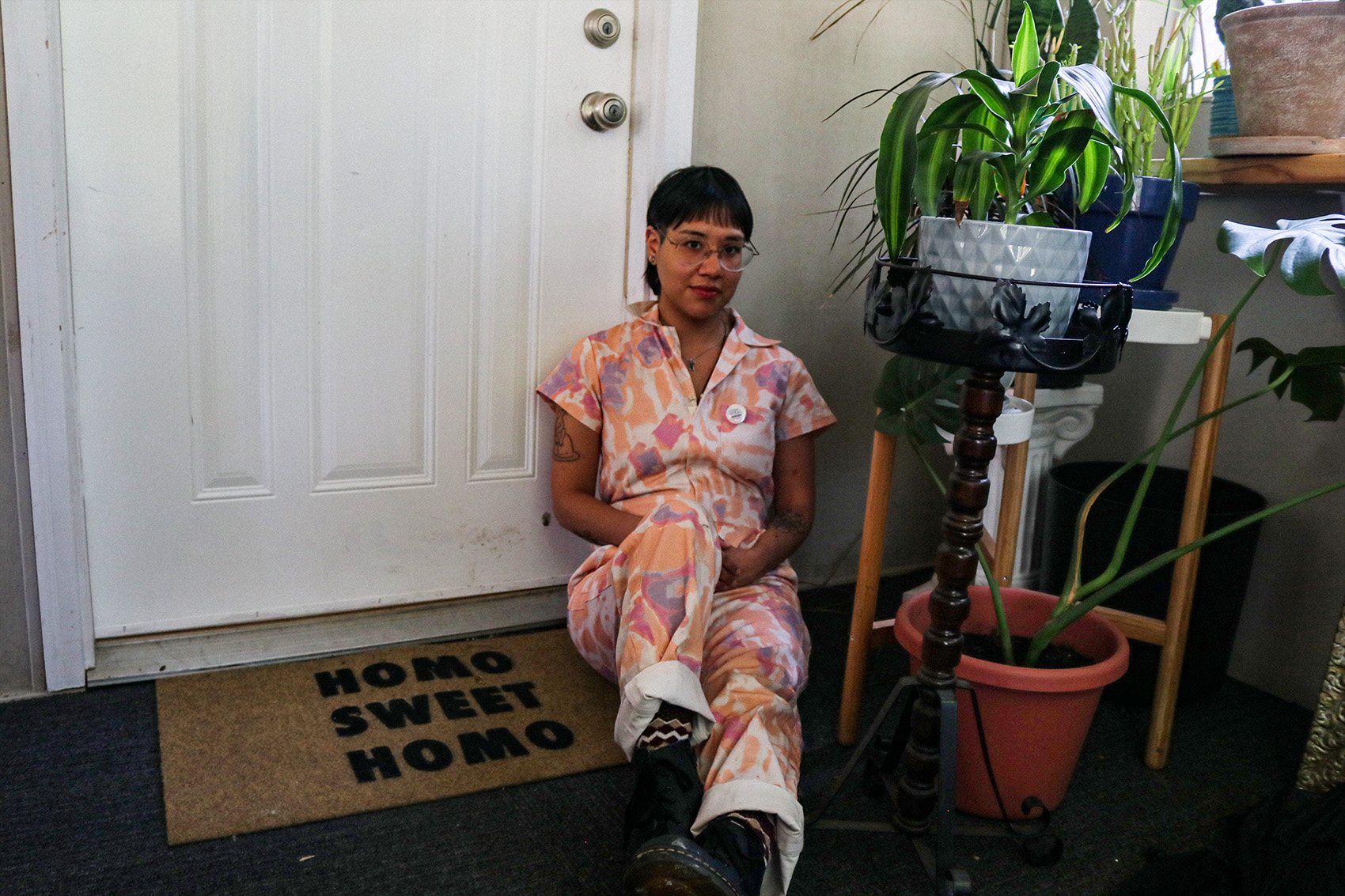
“Homo Sweet Homo”: Foote is advocating for underserved communities.
LUCIA CHENG / NEXTGENRADIO
